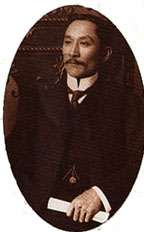Won Alexander Cumyow
Won Alexander Cumyow (traditional Chinese: 溫金有; simplified Chinese: 温金有; pinyin: Wēn Jīnyǒu; Wade–Giles: Wen Chin-yu) was an early Chinese Canadian public servant and community leader.

Early life
Born 1861 March 17 or February 14 in Port Douglas, British Columbia (at the north end of Harrison Lake, at the start of the Douglas Road to Lillooet, British Columbia during the Fraser Canyon Gold Rush), Won Cumyow was the oldest son of Won Ling Sing, a Hakka-speaking store and restaurant owner who had emigrated in 1858 from China to San Francisco and later to Port Douglas.[1] Won Cumyow was the first person of Chinese descent known to have been born within the boundaries of present-day Canada (British Columbia being a colony in 1861).
He attended high school in New Westminster and became a court interpreter (1888)[2] and labour contractor. He was an interpreter in the Vancouver police court from 1904 to 1936, speaking English, Cantonese, Hakka, and also the Chinook Jargon which he had learned as a child at Port Douglas. He studied law, even articled, but was not permitted a license because, being Chinese, he was denied the vote.
Cumyow voted for the first time in 1890 but provincial legislation in 1895-1896[3] stripped Chinese (and Japanese and First Nations) voting rights in elections in BC (though his name still does appear on the 1898 BC voters list).[4] The voters' list in federal elections came from the provincial election's voters' list, and so the federal franchise was also blocked. The federal Chinese Immigration Act of 1923 also known as the Chinese Exclusion Act, was repealed after World War II on 1947 May 14, and he then voted again in the next federal election in 1949—making him the only Chinese person to have voted both before and after the disenfranchisement. A photo[5] of him voting has been reprinted many times.
Community
Active in the Vancouver's Chinese community, he was founder of the Chinese Empire Reform Association (an organization of overseas Chinese, active mostly between 1899 and 1911, made up of mostly the older, more prosperous Chinese merchants in Canada, and supporting the modernization of China through progressive reforms within the framework of a constitutional monarchy rather than by armed revolution), and a president of the Chinese Benevolent Association. Chinese merchants had formed the Chinese Consolidated Benevolent Association, with the first branch in Victoria in 1884 and the second one in Vancouver in 1895. The Association was mandatory[6] for all Chinese in the area to join, and it did everything from representing members in legal disputes to sending the remains of a member who died back to his or her ancestral homeland in China.
Marriage
Won Cumyow married Ye Eva Chan 1889 November 29.[7] A Chinese Methodist missionary family had adopted her and brought her to Canada from Hong Kong in 1888. Together Won Cumyow and Ye Eva had ten children. Their third son, Gordon Won Cumyow, took over the position of court interpreter and became the first Chinese notary public in Canada.
Death
Won Alexander Cumyow died on October 6, 1955, in Vancouver.[8]
References
- Steinberg, Shirley R. Diversity and Multiculturalism: A Reader. Peter Lang "One of these, Won Alexander Cumyow, was born at Fort Harrison [Port Douglas] in 1861, the son of Hakka-speaking parents who had come from China.".
- Henderson's British Columbia Gazetteer and Directory. 1890. p. 130.
- "1898 Voter registration information".
- "Won Cumyow & brother Cumye on 1898 BC Voters' list".
- "1949 Photo of Cumyow voting".
- All Chinese were asked to donate $2. If they did not, they would have to pay much more if they ever required the services of the association.
- "1889 Marriage certificate".
- "Vancouver Sun obituary, 1955".
External links
- Won Cumyow & family in 1881 Canadian Census
- Won Cumyow & family in 1891 Canadian Census
- Won Cumyow & family in 1901 Canadian Census
- Won Cumyow & family in 1911 Canadian Census
- Won Cumyow registered as first native-born under 1923 Chinese Immigration Act
- PDF - Biography on SFU site
- List of fonds at University of British Columbia
- PDF describing fonds at UBC
- PDF file containing relevant source documents